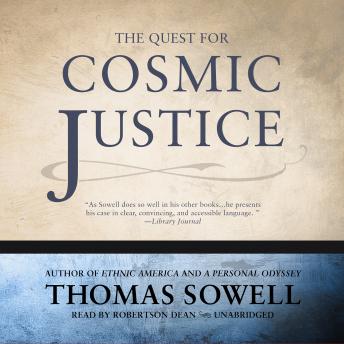Dismantling America
By: Thomas Sowell
Narrated by: Robertson Dean
Length: 8 hrs and 7 mins
Release date: 08-11-10
Publisher: Blackstone Audio, Inc.
Genre: Conservatism and Liberalism, Political Commentary, Social Studies
My Rating: 4.0 of 5.0 Overall; Story 4.0; Narration 4.0.
Publisher's Summary
These wide-ranging essays - on many individual political, economic, cultural, and legal issues - have as a recurring, underlying theme the decline of the values and institutions that have sustained and advanced American society for more than two centuries. This decline has been more than erosion. It has, in many cases, been a deliberate dismantling of American values and institutions by people convinced that their superior wisdom and virtue must override both the traditions of the country and the will of the people.
Whether these essays (originally published as syndicated newspaper columns) are individually about financial bailouts, illegal immigrants, gay marriage, national security, or the Duke University rape case, the underlying concern is about what these very different kinds of things say about the general direction of American society.
This larger and longer-lasting question is whether the particular issues discussed reflect a degeneration or dismantling of the America that we once knew and expected to pass on to our children and grandchildren. There are people determined that this country’s values, history, laws, traditions, and role in the world are fundamentally wrong and must be changed. Such people will not stop dismantling America unless they get stopped—and the next election may be the last time to stop them, before they take the country beyond the point of no return.
©2010 Thomas Sowell (P)2010 Blackstone Audio, Inc.
Review:
I was immediately pulled in by the clear, though disturbing, essays in this collection. As noted in the blurb, the topics are varied: financial issues, illegal immigrants, national security (or lack thereof), gay marriage, and more. The short essays present logical analysis of the impact of political and corporate policies. The focus is on the years of the Obama administration, but Sowell does relate to earlier steps that started the downward trend of American values, particularly since the Reagan years.
I do like Thomas Sowell’s writings and his conservative and libertarian philosophy. I respect his reasoned approach to economic, society, and political issues. I liked the essay format which made this easy to listen to in interrupted settings. The discussions are presented in clear, uncomplicated arguments that can be understood by a wide audience of education, i.e. high school to graduate school levels. My only con is that there seemed to be an inconsistent flow and some repetitive content which may have been the result of pulling together former columns.
Not everyone will agree with Sowell’s views and arguments. I do recommend this for people willing to listen to logical, conservative arguments.
Audio Notes: Robertson Dean does a fine job with the narration. He delivers the essays clearly with an even emotional level. I appreciate that I was able to listen to this through the Audible Plus Catalog.
Source: June 2021 Free from Audible Plus Catalog. This qualifies for 2022TBR, 2022Audiobook, and 2022Alphabet goal.



![The Possibility of America: How the Gospel Can Mend Our God-Blessed, God-Forsaken Land by [Dark, David]](https://images-na.ssl-images-amazon.com/images/I/41VE9PH1MZL.jpg)

